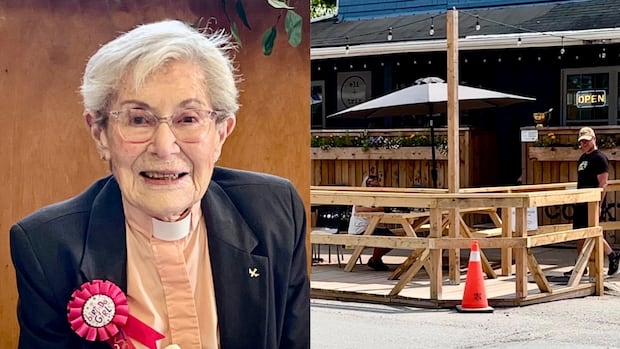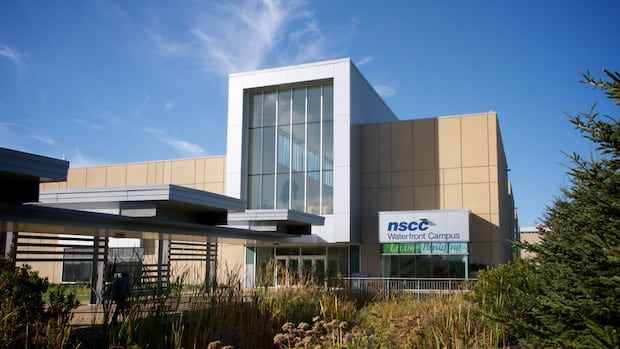‘It was beautiful and heartbreaking’: Community turns out against ‘ill-suited’ tree clearing policy in Elmfield, N.S.

ELMFIELD, N.S. — For Nova Poirier, loving the environment comes with its fair share of sorrow as it shifts and changes.
It’s something she’s accepted as she lives close to nature and guides people on their spiritual and healing journeys through it.
What she wasn’t expecting was to see the trees lining the dirt road she lives and works on be shredded, torn and mutilated by machinery in an effort by the Department of Public Works (DPW) to maintain the road and clear brush and foliage.
“It’s terrible,” said Poirier. “There were lucky ones (trees) that, somehow, we asked them not to cut. But even if they intended to leave it, the machine is so clumsy and ill-suited that when it’s waving that big thing around, it’s actually scarring and mutilating trees it didn’t intend.”
No notice
The work began on Dec. 7 with the feller buncher and workers in trucks arriving at the beginning of the dirt road, just off Elmfield Road, before anyone knew what was happening.
“They just showed up over at the bottom of the road with those large machines, those harvesters and began the process of chewing the trees,” she said.
Poirier describes the people who live along MacBeth Road as nature-loving people, with many choosing to live amongst the forest, ravine and brook to be closer to the natural world.
For Poirier, the lack of notice and the method of foliage maintenance was startling. She said that in the past, previous maintenance work done by DPW was largely limbing trees and using a bush hog. The large machinery that saw trees shredded and chipped hadn’t been used before on the road, other than a couple of one-off situations following hurricanes.
“We have never seen this kind of work on this road, except after the hurricane and only in a few spots. They took in machinery to deal with certain spots,” she added.

Triggering and upsetting
Poirier isn’t the only one upset about DPW’s work along MacBeth Road. Annie Ferguson, a friend of Poirier’s who owns property on the road and leads hikes through the area with Hike Nova Scotia, described the work done by DPW as triggering.
“A lot of us are still a little bit traumatized by what happened out here through Fiona, and seeing this sort of willful destruction on the heels of that is terrible and triggering,” said Ferguson.
She added that looking out from the road now and seeing clear-cut parcels of land, the destruction of the apple and maple trees that provided much-needed shade and shelter has been heartbreaking.
“I get sick every time I think of the deer trying to cross through that (clear-cut land). I can’t imagine they won’t get splinters or hurt their tendons – it makes me ill,” Ferguson added.

Thoughtful maintenance
Both Poirier and Ferguson feel that the work done was unnecessary.
“We’re not against maintenance,” said Poirier. “We need accountability.”
According to Ferguson, the work done along Macbeth Road of clearing trees up to five feet from the sides of all roads despite classification is a new policy adopted by DPW. She added that MacBeth Road isn’t the first road in the county to experience this work either, with Green Hill Road receiving a similar maintenance treatment.
“I know Green Hill is probably a class two highway in some regards (than a country road). But it’s another example of a road mistreating the trees,” Ferguson said.
SaltWire reached out to DPW for comment about the work done. Gary Andrea, a spokesperson for DPW, provided an emailed statement explaining that the work done on MacBeth Road was to improve safety along the road by improving line-of-sight and removing trees that could block the road during storms and weather events that bring high winds.
“In the winter, this also gives us the ability to push snow back further during road clearing operations, and it improves drainage in ditches,” Andrea added.
For Poirier and Ferguson, there are different ways to maintain road safety than what was done, especially given that the road only has five homes and doesn’t get much traffic.
“To come into an intimate neighbourhood where you look for experiences to create an intimacy or reconnection with nature and treat that with the same regard as you would the 100 series – it’s too far,” said Ferguson.

Protest
On Dec. 20, the day DPW was finishing maintenance work on MacBeth Road, Poirier and Ferguson organized a protest with members of the neighbourhood and the neighbouring communities turning out in support.
“It was a good opportunity to instill some sort of faith and accountability back into that department,” she said. “Instead, it’s enraged so many people.”
Poirier added that prior to this situation, they had no problems with DPW. If the road needed to be plowed, they responded quickly, and the same went for if there was a washout or any fallen trees on the road.
“We take good care of this road in the way we can,” Poirier said.

While they knew that the protest was too late to prevent the work done in their community, Poirier and Ferguson said they held the protest to raise awareness and would like to see the policy changed.
“I think it’s the blanket nature of the policy that needs to change,” said Poirier, “number one, the machine is not appropriate, as well as the blanket nature of their policy. Also, not considering this road’s unique nature and use and history – they’ve really taken something away from people.”
For now, Poirier and Ferguson are working through coming to terms with what the forests of their community have lost, but they’re proud of the people who turned out in support.
“I’ve been involved in action before for the road, but so many people older people have not. They’re not necessarily comfortable with this kind of thing. But there they were, standing down there with their signs. It was beautiful and heartbreaking,” said Poirier.



